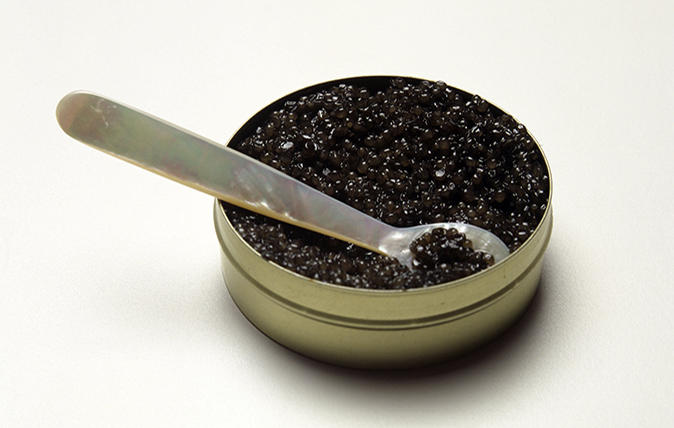Discover caviar from Exmoor
Country Life visits the top secret fish farm where an enterprising business is making incredible caviar, on Exmoor, and giving the Russians a run for their money


By Julie Harding
The rendezvous is a car park in a slumberous Devon town. Ken Benning, chief executive of Exmoor Caviar, roars up in a spotless black Mercedes SUV, number plate CAV14R. We’re half an hour ahead of schedule, which is a relief as he’s warned me he only has an hour to spare before sprinting up the A303 for a 4pm meeting in London. ‘Follow me,’ he smiles, before racing off down the lane. I was expecting to be blindfolded and chauffeur-driven to Exmoor Caviar’s production site. The location of the farm is such a closely guarded secret that I understand no journalist has ever been privy to the postcode. A left turn takes us onto a narrower lane and the fish farm comes into view, obvious from the giant concrete tanks topped with black, predator-repelling nets.
‘This is it,’ announces Mr Benning (aka Caviar Ken), simultaneously panning with an arm and pulling on his Le Chameau boots. The former salmon-and-trout farm was built in the 1950s and purchased by current owner Pat Noble in 2001. A sturgeon expert, Mr Noble studied these 200-million-year-old leviathans at university and passed on his knowledge to his son, George, now his business partner. The trio met via eBay, when George Noble advertised his ornamental fingerlings for sale, but Mr Benning, who owns online retail company London Fine Foods Group, which sells foie gras and truffles alongside British and imported caviar, had a different plan. He was contemplating waging a fishegg war in a market on which Russia and Iran have enjoyed a stranglehold. ‘People thought I was a lunatic,’ he says. ‘It was a gamble producing a British caviar, but I had a feeling chefs would like it.’
They did and do, including Alan Bird, former executive chef at The Ivy, James ‘Jocky’ Petrie, formerly of The Fat Duck, The Ledbury’s Brett Graham and Ashley Palmer-Watts at Heston Blumenthal’s Dinner. Exmoor Caviar has been purchased by Buckingham Palace and Downing Street. It’s just celebrated its fourth season and now accounts for the lion’s share of London Fine Foods’ retail and wholesale caviar sales. Despite the £499.95 per 250g price tag, people can’t get enough of this black gold. ‘We’ve worked hard and it hasn’t been easy. The hardest thing we faced was negativity from competitors,’ Mr Benning explains. ‘It’s also one thing getting a sturgeon up to maturity and another making a decent caviar. Everyone had underestimated the costs, too. Our first season was a big learning curve, but I knew 100% that we could make it and I’m proud of what we’ve achieved against the odds.’
Mr Benning strides out onto the moor, across a triangular-shaped meadow bordered by a tree-lined escarpment and the River Mole. His conversation and route march match each other for speed. The farm begins at the apex of this meadow where 40 million litres (almost nine million gallons) of the river’s spring waters are funneled into a 70-year-old, man-made channel that fuels this farm and its fish.
‘We got lucky. It was a crazy, hairbrained idea that paid off, but it’s the River Mole that makes the caviar 100% different in terms of taste,’ he advises. ‘Even Russian billionaires say it’s good. I’m convinced that it’s the farm that enhances the product. Although others spend millions on filters, chemicals and nitrates, we use nothing artificial.’
Mr Benning first encountered fish farming in his childhood. His parents diversified in this direction, but lost every trout during the stifling summer of 1990, when their Sussex stream dried up. That was the end of their business as well as their marriage. At 22, Mr Benning’s interest in commerce took him into the COUNTRY LIFE advertising sales department—from which he was given his marching orders after an incident with a lost scooter in Palma —and to India to rebuild the Financial Times’s Automotive World, but, eventually, he returned to the UK to concentrate on London Fine Foods, a business he had launched in his potting shed. ‘Even when the temperature was 3° and Jemima [his wife, business partner and mother of five children] was pregnant, you would still find her in that shed. Jemima is the only person who will work with me.’
Exquisite houses, the beauty of Nature, and how to get the most from your life, straight to your inbox.
Back on the yard, all is quiet. The season, which runs from October to April, ended recently, so there is no egg extraction to witness, only the sight of tens of thousands of Siberian sturgeon of varying proportions swimming in the concrete tanks. Up until now, the female fish have been humanely killed for their eggs—each fish produces about 10% of its weight in caviar—and their meat, but even a brilliant communicator like Mr Benning has struggled to persuade the British public that sturgeon is irresistible on a plate.
‘Next season, our fish will be put back into the system, so our model is going to be more sustainable. We can now extract eggs without killing the fish, as they are already doing in Germany and Latvia,’ he explains.
Exmoor Caviar produces to order, processes and transports to London within a few hours and prides itself on getting the product to customers when they want it. ‘We tick all the boxes for the customers and the chefs,’ says Mr Benning, who is building another sturgeon farm in Sussex. ‘Caviar farming isn’t about bulk. Ours is a niche-market business. There are operations that are 10, 20 or 30 times the size of ours, but one of the biggest is about to go bust.’ The following day, Mr Benning sends me a package of Exmoor Caviar. I eat and close my eyes: I’m back on the moor under a blue sky with the river running past. It really does taste of Exmoor. Heavenly!
London Fine Foods, 563–565, Battersea Park Road, London SW11 (08456 439121; www.londonfinefoods.co.uk)
